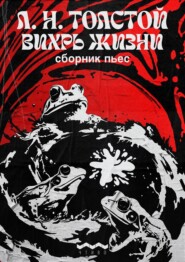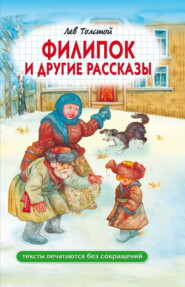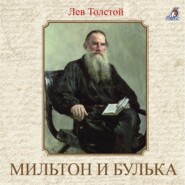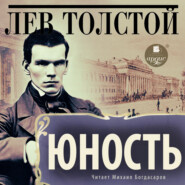По всем вопросам обращайтесь на: info@litportal.ru
(©) 2003-2025.
✖
What Shall We Do?
Настройки чтения
Размер шрифта
Высота строк
Поля
It happened thus: In one very large and almost empty night-lodging, I asked an old woman whether there were any poor people who had nothing to eat. She hesitated a moment and then named two; then suddenly, as if recollecting herself, she said, “Yes, there lies one of them,” pointing to a pallet. “This one,” she added, “indeed, has nothing to eat.”
“You don't say so! Who is she?”
“She has been a lost woman; but as nobody takes her now, she can't earn anything. The landlady has had pity on her, but now she wants to turn her out. – Agafia! I say, Agafia!” cried the old woman.
We went a little nearer, and saw something rise from the pallet. This was a grey-haired, dishevelled woman, thin as a skeleton, in a dirty, torn chemise, and with peculiarly glittering, immovable eyes. She looked fixedly beyond us, tried to snatch up her jacket behind her in order to cover her bony chest, and growled out like a dog, “What? what?”
I asked her how she managed to live. For some time she was unable to see the drift of my words and said, “I don't know myself; they are going to turn me out.”
I asked again; and oh, how ashamed of myself I feel! my hand can scarcely write it! I asked her whether it was true that she was starving. She replied in the same feverish, excited manner, “I had nothing to eat yesterday; I have had nothing to eat to-day.”
The miserable aspect of this woman impressed me deeply, but quite differently from those in Liapin's house: there, out of pity for them, I felt embarrassed and ashamed of myself; but here, I rejoiced that I had at last found what I had been looking for, – a hungry being.
I gave her a ruble and I remember how glad I felt that the others had seen it.
The old woman forthwith asked me also for money. It was so pleasant to me to give that I handed her some also, without thinking whether it was necessary or not. She accompanied me to the door, and those who were in the corridor heard how she thanked me. Probably my questions about the poor provoked expectations, for some of the inmates began to follow us wherever we went.
Among those that begged, there were evidently drunkards, who gave me a most disagreeable impression; but having once given to the old woman I thought I had no right to refuse them, and I began to give away more. This only increased the number of applicants, and there was a stir throughout the whole lodging-house.
On the stairs and in the galleries, people appeared dogging my steps. When I came out of the yard, a boy ran quickly down the stairs, pushing through the people. He did not notice me and said hurriedly, —
“He gave a ruble to Agafia!”
Having reached the ground, he, too, joined the crowd that was following me. I came out into the street. All sorts of people crowded round begging for money. Having given away all I had in coppers, I entered a shop and asked the proprietor to give me change for ten rubles.
Here occurred a scene similar to that which took place in Liapin's house. A dreadful confusion ensued. Old women, seedy gentlefolk, peasants, children, all crowded about the shop, stretching out their hands; I gave, and asked some of them about their position and means, and entered all in my note-book. The shopkeeper, having turned up the fur collar of his great-coat, was sitting like a statue, glancing now and then at the crowd, and again staring beyond it. He apparently felt like everyone else, that all this was very foolish, but he dared not say so.
In Liapin's house the misery and humiliation of the people had overwhelmed me; and I felt myself to blame for it, and also the desire and the possibility of becoming a better man. But though the scene here was similar, it produced quite a different effect. In the first place, I felt angry with many of those who assailed me, and then anxious as to what the shopmen and the dvorniks might think of me. I returned home that day with a weight on my mind. I knew that what I had done was foolish and inconsistent; but, as usual when my conscience was troubled, I talked the more about my projected plan, as if I had no doubt whatever as to its success.
The next day I went alone to those whom I had noted down, and who seemed the most miserable, thinking they could be more easily helped than others.
As I have already mentioned, I was not really able to help any of these people. It turned out that to do so was more difficult than I had imagined: in short, I only tormented these men and helped no one.
Before the last visiting-tour I went several times to Rzhanoff's house, and each time the same thing occurred: I was assailed by a crowd of men and women in the midst of whom I utterly lost my presence of mind.
I felt the impossibility of doing anything because there were so many of them; besides, each of them, taken separately, did not awaken any sympathy in me. I felt that every one lied, or at least prevaricated, and regarded me only as a purse out of which money could be drawn. It often seemed to me that the very money extorted from me did not improve their position but only made it worse.
The oftener I went to these houses, the closer the intercourse which I had with the inmates, the more apparent became the impossibility of doing anything; but notwithstanding this, I did not give up my plan until after the last night tour with the census-takers.
I feel more ashamed of this visit than of any other. Formerly I had gone alone, but now twenty of us went together. At seven o'clock all who wished to take part in this last tour began to assemble in my house. They were almost all strangers to me. Some students, an officer, and two of my fashionable acquaintances, who, after having repeated the usual phrase, “C'est très intéressant!” asked me to put them into the number of the census-takers.
These fashionable friends of mine had dressed themselves in shooting-jackets and tall travelling boots, which they thought more suited to the visit than their ordinary clothes. They carried with them peculiar pocket-books and extraordinary-looking pencils. They were in that agitated state of mind which one experiences just before going to a hunt, or to a duel, or into a battle. The falseness and foolishness of our enterprise was now more apparent to me in looking at them; but were we not all in the same ridiculous position?
Before starting we had a conference, somewhat like a council of war, as to what we should begin with, how to divide ourselves, and so on. This conference was just like all other official councils, meetings, and committees: each spoke, not because he had anything to say, or to ask, but because every one tried to find something to say in order not to be behind the rest. But during the conversation no one alluded to the acts of benevolence to which I had so many times referred; and however much ashamed I felt, I found it was needful to remind them that we must carry out our charitable intentions by writing down, during the visiting-tour, the names of all whom we should find in a destitute condition.
I had always felt ashamed to speak about these matters; but here, in the midst of our hurried preparations for the expedition, I could scarcely utter a word about them. All listened to me and seemed touched, all agreed with me in words; but it was evident that each of them knew that it was folly, and that it would lead to nothing, and so they began at once to talk about other subjects, and continued doing so until it was time for us to start.
We came to the dark tavern, aroused the waiters, and began to sort out papers. When we were told that the people, having heard about this visiting-tour, had begun to leave their lodgings, we asked the landlord to shut the gate, and we ourselves went to the yard to persuade those to remain who wanted to escape, assuring them that no one would ask to see their passports.
I remember the strange and painful impression produced upon me by these frightened night-lodgers. Ragged and half-dressed, they all appeared tall by the light of the lantern in the dark court-yard. Frightened and horrible in their terror, they stood in a small knot round the pestilential out-house, listening to our persuasions, but not believing us; and, evidently, like hunted animals, prepared to do anything to escape from us.
Gentlemen of all kinds, town and country policemen, public coroner and judges, had, all their lives, been hunting them in towns and villages, on the roads and in the streets, in the taverns and in the lodging-houses, and suddenly these gentlemen had come at night and shut the gate, only, forsooth, in order to count them! They found this as difficult to believe as it would be for hares to believe that the dogs had come out not to catch but to count them.
But the gates were shut, and the frightened night-lodgers returned to their places; and we, having separated into groups, began our visit. With me were my fashionable acquaintances and two students. Ványa, with a lantern, went before us in a great-coat and white trousers, and we followed. We entered lodgings well known to me. The place was familiar, some of the persons also; but the majority were new to me, and the spectacle was also a new and dreadful one, – still more dreadful than that which I had seen at Liapin's house. All the lodgings were filled, all the pallets occupied, and not only by one, but often by two persons. The sight was dreadful, because of the closeness with which these people were huddled together, and because of the indiscriminate commingling of men and women. Such of the latter as were not dead-drunk were sleeping with men. Many women with children slept with strange men on narrow beds.
The spectacle was dreadful, owing to the misery, dirt, raggedness, and terror of these people; and chiefly because there were so many of them. One lodging, then another, then a third, a tenth, a twentieth, and so on, without end. And everywhere the same fearful stench, the same suffocating exhalation, the same confusion of sexes, men and women, drunk, or in a state of insensibility; the same terror, submissiveness, and guilt stamped on all faces, so that I felt deeply ashamed and grieved, as I had before at Liapin's. At last I understood that what I was about to do was disgusting, foolish, and therefore impossible; so I left off writing down their names and questioning them, knowing now that nothing would come of it.
I felt deeply hurt.
At Liapin's I had been like a man who sees a horrible wound on the body of another. He feels sorry for the man, ashamed of not having relieved him before, yet he can still hope to help the sufferer; but now I was like a doctor who comes with his own medicines to the patient, uncovers his wound only to mangle it, and to confess to himself that all he has done has been done in vain, and that his remedy is ineffectual.
CHAPTER XI
This visit gave the last blow to my self-deception. It became very evident to me that my aim was not only foolish, but even productive of evil. Yet, though I knew this, it seemed my duty to continue the project a little longer: first, because of the article I had written and by my visits I had raised the expectations of the poor; secondly, because what I had said and written had awakened the sympathy of some benefactors, many of whom had promised to assist me personally and with money. And I was expecting to be applied to by both, and hoped to satisfy them as well as I was able.
As regards the applications made to me by those who were in need, the following details may be given: I received more than a hundred letters, which came exclusively from the “rich poor,” if I may so express myself. Some of them I visited, and some I left unanswered. In no instance did I succeed in doing any good. All the applications made to me were from persons who were once in a privileged position (I call such persons privileged who receive more from others than they give in return), had lost that position, and were desirous of regaining it. One wanted two hundred rubles in order to keep his business from going to ruin, and to enable him to finish the education of his children; another wanted to have a photographic establishment; a third wanted money to pay his debts, and take his best clothes out of pawn; a fourth was in need of a piano, in order to perfect himself and to earn money to support his family by giving lessons. The majority did not name any particular sum of money: they simply asked for help; but when I began to investigate what was necessary, it turned out that their wants increased in proportion to the help offered, and nothing satisfactorily resulted. I repeat again, the fault may have been in my want of understanding; but in any case I helped no one, notwithstanding the fact that I made every effort to do so.
As for the philanthropists who were to co-operate with me, something very strange and quite unexpected occurred: of all who promised to assist with money, and even stated the amount they would give, not one contributed anything for distribution among the poor.
The promises of pecuniary assistance amounted to about three thousand rubles; but of all these people, not one recollected his agreement, or gave me a single kopek. The students alone gave the money which they received as payment for visiting, about twelve rubles; so that my scheme, which was to have collected tens of thousands of rubles from the rich, and to have saved hundreds and thousands of people from misery and vice, ended in my distributing at random some few rubles offered by the students, with twenty-five more sent me by the town-council for my labour as manager, which I positively did not know what to do with.
So ended the affair.
Then, before leaving Moscow for the country, on the Sunday before the Carnival, I went to the Rzhanoff house in the morning in order to distribute the thirty-seven rubles among the poor. I visited all whom I knew in the lodgings, but found only one invalid, to whom I gave something, – five rubles, I think. There was nobody else to give to. Of course, many began to beg; but, as I did not know them, I made up my mind to take the advice of Iván Fedotitch, the tavern-keeper, respecting the distribution of the remaining thirty-two rubles.
It was the first day of the carnival. Everybody was smartly dressed, all had had food, and many were drunk. In the yard near the corner of the house stood an old-clothes man, dressed in a ragged peasant's coat and bark shoes. He was still hale and hearty. Sorting his purchases, he was putting them into different heaps, – leather, iron, and other things, – and was singing a merry song at the top of his voice.
I began to talk with him. He was seventy years of age; had no relatives; earned his living by dealing in old clothes, and not only did not complain, but said he had enough to eat, drink, and to spare. I asked him who in the place were particularly in want. He became cross, and said plainly that there was no one in want but drunkards and idlers; but on learning my object in asking, he begged me five kopeks for drink, and ran to the tavern for it.
I also went to the tavern to see Iván Fedotitch, to ask him to distribute the money for me. It was full; gayly-dressed tipsy prostitutes were walking to and fro; all the tables were occupied; many people were already drunk; and in the small room someone was playing a harmonium, and two people were dancing. Iván Fedotitch, out of respect for me, ordered them to leave off, and sat down next me at a vacant table. I asked him, as he knew his lodgers well, to point out those most in want, as I was intrusted with a little money for distribution, and wished him to direct me. The kind-hearted man (he died a year after) gave me his attention for a time in order to oblige me, although he had to wait on his customers. He began to think it over, and was evidently puzzled. One old waiter had overheard us, and took his part in the conference.
They began to go over his lodgers, some of whom were known to me, but they could not agree. “Paramonovna,” suggested the waiter.
“Well; yes, she does go hungry sometimes; but she drinks.”
“What difference does that make?”
“Well, Spiridon Ivanovitch, he has children; that's the man for you.”
But Iván Fedotitch had doubts about Spiridon too.
“Akulina, but she has a pension. Ah, but there is the blind man!”
To him I myself objected: I had just seen him. This was an old man of eighty years of age, without any relatives. One could scarcely imagine any condition to be worse; and yet I had just seen him lying drunk on a feather bed, cursing at his comparatively young mistress in the most filthy language.
They then named a one-armed boy and his mother. I saw that Iván Fedotitch was in great difficulty owing to his conscientiousness, for he knew that every thing given away by me would be spent at his tavern. But as I had to get rid of my thirty-two rubles, I insisted, and we managed somehow or other to distribute the money. Those who received it were mostly well-dressed, and we had not far to go to find them: they were all in the tavern. The one-armed boy came in top-boots and a red shirt and waistcoat.
Thus ended all my benevolent enterprises; and I left for the country vexed with everyone, as it always happens when one does something foolish and harmful. Nothing came of it all, except the train of thoughts and feelings which it called forth in me, which not only did not cease, but doubly agitated my mind.

















